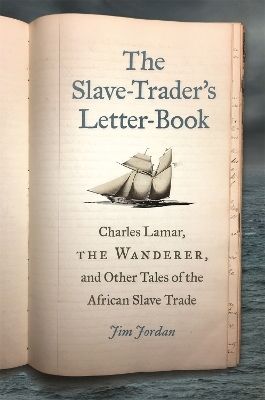
The Slave-Trader's Letter-Book
Charles Lamar, the Wanderer, and Other Tales of the African Slave Trade
Seiten
2019
University of Georgia Press (Verlag)
978-0-8203-5687-7 (ISBN)
University of Georgia Press (Verlag)
978-0-8203-5687-7 (ISBN)
Recounts the flamboyant and reckless life of Savannah businessman Charles Lamar, including Lamar's involvement in southern secession, the slave trade, and a plot to overthrow the government of Cuba. The second part presents the ""Slave-Trader's Letter-Book"" which sheds light on the lead-up to the American Civil War.
In 1858 Savannah businessman Charles Lamar, in violation of U.S. law, organized the shipment of hundreds of Africans on the luxury yacht Wanderer to Jekyll Island, Georgia. The four hundred survivors of the Middle Passage were sold into bondage. This was the first successful documented slave landing in the United States in about four decades and shocked a nation already on the path to civil war.
In 1886 the North American Review published excerpts from thirty of Lamar’s letters from the 1850s, reportedly taken from his letter book, which describe his criminal activities. However, the authenticity of the letters was in doubt until very recently. In 2009, researcher Jim Jordan found a cache of private papers belonging to Charles Lamar’s father, stored for decades in an attic in New Jersey. Among the documents was Charles Lamar’s letter book, confirming him as the author. The Lamar documents, including the Slave-Trader’s Letter Book, are now at the Georgia Historical Society and are available for research.
This book has two parts. The first recounts the flamboyant and reckless life of Lamar himself, including Lamar’s involvement in southern secession, the slave trade, and a plot to overthrow the government of Cuba. A portrait emerges at odds with Lamar’s previous image as a savvy entrepreneur and principled rebel. Instead, we see a man who was often broke and whose volatility sabotaged him at every turn. His involvement in the slave trade was driven more by financial desperation than southern defiance. The second part presents the "Slave-Trader’s Letter-Book." Together with annotations, these seventy long-lost letters shed light on the lead-up to the Civil War from the remarkable perspective of a troubled, and troubling, figure.
In 1858 Savannah businessman Charles Lamar, in violation of U.S. law, organized the shipment of hundreds of Africans on the luxury yacht Wanderer to Jekyll Island, Georgia. The four hundred survivors of the Middle Passage were sold into bondage. This was the first successful documented slave landing in the United States in about four decades and shocked a nation already on the path to civil war.
In 1886 the North American Review published excerpts from thirty of Lamar’s letters from the 1850s, reportedly taken from his letter book, which describe his criminal activities. However, the authenticity of the letters was in doubt until very recently. In 2009, researcher Jim Jordan found a cache of private papers belonging to Charles Lamar’s father, stored for decades in an attic in New Jersey. Among the documents was Charles Lamar’s letter book, confirming him as the author. The Lamar documents, including the Slave-Trader’s Letter Book, are now at the Georgia Historical Society and are available for research.
This book has two parts. The first recounts the flamboyant and reckless life of Lamar himself, including Lamar’s involvement in southern secession, the slave trade, and a plot to overthrow the government of Cuba. A portrait emerges at odds with Lamar’s previous image as a savvy entrepreneur and principled rebel. Instead, we see a man who was often broke and whose volatility sabotaged him at every turn. His involvement in the slave trade was driven more by financial desperation than southern defiance. The second part presents the "Slave-Trader’s Letter-Book." Together with annotations, these seventy long-lost letters shed light on the lead-up to the Civil War from the remarkable perspective of a troubled, and troubling, figure.
Jim Jordan is an author and historian living in South Carolina. He is the author of the novels Savannah Grey: A Tale of Antebellum Georgia and Penny Savannah: A Tale of Civil War in Georgia. Stephen Berry is an associate professor of history at the University of Georgia. His books include House of Abraham: Lincoln and the Todds, a Family Divided by War; All That Makes a Man: Love and Ambition in the Civil War South, and Princes of Cotton: Four Diaries of Young Men in the South, 1848–1860 (Georgia).
| Erscheinungsdatum | 17.10.2019 |
|---|---|
| Reihe/Serie | UnCivil Wars Series |
| Mitarbeit |
Herausgeber (Serie): Stephen Berry, Amy Murrell Taylor |
| Zusatzinfo | 6 black and white images |
| Verlagsort | Georgia |
| Sprache | englisch |
| Maße | 152 x 229 mm |
| Gewicht | 545 g |
| Themenwelt | Natur / Technik ► Fahrzeuge / Flugzeuge / Schiffe ► Schiffe |
| Geisteswissenschaften ► Geschichte ► Regional- / Ländergeschichte | |
| Geschichte ► Teilgebiete der Geschichte ► Militärgeschichte | |
| Sozialwissenschaften ► Politik / Verwaltung | |
| Sozialwissenschaften ► Soziologie ► Makrosoziologie | |
| ISBN-10 | 0-8203-5687-5 / 0820356875 |
| ISBN-13 | 978-0-8203-5687-7 / 9780820356877 |
| Zustand | Neuware |
| Haben Sie eine Frage zum Produkt? |
Mehr entdecken
aus dem Bereich
aus dem Bereich
internationales Jahrbuch der Seefahrt
Buch | Softcover (2024)
Koehler in Maximilian Verlag GmbH & Co. KG
CHF 35,90


